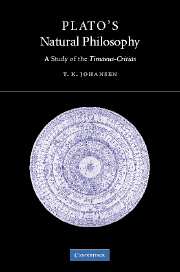Book contents
- Frontmatter
- Contents
- Acknowledgements
- Introduction: Plato's tales of teleology
- 1 What is the Timaeus-Critias about?
- 2 The status of the Atlantis story
- 3 The status of Timaeus' account
- 4 Teleology and craftsmanship
- 5 Necessity and teleology
- 6 Space and motion
- 7 Body, soul, and tripartition
- 8 Perception and cosmology
- 9 Dialogue and dialectic
- Epilogue
- Bibliography
- General index
- Index locorum
1 - What is the Timaeus-Critias about?
Published online by Cambridge University Press: 03 September 2009
- Frontmatter
- Contents
- Acknowledgements
- Introduction: Plato's tales of teleology
- 1 What is the Timaeus-Critias about?
- 2 The status of the Atlantis story
- 3 The status of Timaeus' account
- 4 Teleology and craftsmanship
- 5 Necessity and teleology
- 6 Space and motion
- 7 Body, soul, and tripartition
- 8 Perception and cosmology
- 9 Dialogue and dialectic
- Epilogue
- Bibliography
- General index
- Index locorum
Summary
One of the basic puzzles of the Timaeus-Critias concerns the thematic unity of the dialogue. Why is the bulk of the dialogue taken up with a discussion of natural philosophy when it apparently sets out simply to give an account of a war between Atlantis and ancient Athens? What, if anything, does natural philosophy have to do with war?
The Timaeus-Critias is presented as a continuation of the Republic. Socrates begins by reporting a conversation he had yesterday, in which he described a constitution (politeia) which in outline matches that of the Republic. He now expects his listeners from yesterday to repay him in kind. Here is what he wants:
And now, in the next place, listen to what my feeling is with regard to the city which we have described. I may compare my feeling (pathos) to something of this kind: suppose, for instance, that on seeing beautiful creatures, whether works of painting (graphē) or actually alive but in repose, a man should be moved with desire to behold them in motion and vigorously engaged in some such exercise as seemed suitable to their bodies; well, that is the very feeling I have regarding the city we have described. Gladly would I listen to anyone who should describe in words our city contending against others in those struggles which cities wage; in how proper a fashion it enters into war, and how in its warring it exhibits qualities such as befit its education and training in its dealings with each several city whether in respect of military actions or in respect of verbal negotiations.[…]
- Type
- Chapter
- Information
- Plato's Natural PhilosophyA Study of the Timaeus-Critias, pp. 7 - 23Publisher: Cambridge University PressPrint publication year: 2004



